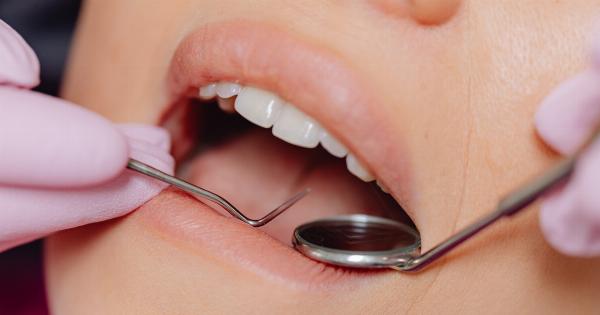Periodontitis, also known as gum disease, is a serious infection that affects the gums and bone supporting the teeth. It is caused by the buildup of bacteria in the mouth that forms a sticky film called plaque.
If left untreated, it can lead to tooth loss and other health complications. Here are some common signs and symptoms of periodontitis:.
1. Bleeding Gums
Bleeding gums are one of the most common signs of periodontitis. If your gums bleed when you brush or floss your teeth, it may be a sign of gum disease. The bleeding is caused by inflammation and infection in the gums that weakens the blood vessels.
2. Bad Breath
Bad breath, also known as halitosis, is another common symptom of periodontitis. The bacteria that cause gum disease release toxins that can cause a foul odor in the mouth. No matter how much you brush or use mouthwash, the bad breath persists.
3. Receding Gums
As gum disease progresses, the gums start to pull back or recede from the teeth, exposing more of the tooth root. This can make the teeth look longer than normal and can cause tooth sensitivity.
4. Loose Teeth
As the infection spreads, it can weaken the bone supporting the teeth, causing them to become loose and eventually fall out. Loose teeth are a serious sign of advanced gum disease and require immediate treatment to prevent tooth loss.
5. Painful Chewing
If you experience pain or discomfort when chewing, it may be a sign of periodontitis. The infection can cause inflammation in the gums and bone, making it difficult to chew food properly.
6. Pus Between Teeth
If you notice pus or a discharge between your teeth and gums, it may be a sign of gum disease. This is caused by the buildup of bacteria and toxins in the pockets between the teeth and gums.
7. Changes in Bite
Periodontitis can cause changes in the way your teeth fit together when you bite down. If you notice a change in your bite or feel pressure on certain teeth, it may be a sign of gum disease.
8. Red, Swollen Gums
Red, swollen gums that feel tender to the touch are a sign of inflammation and infection in the gums. If you experience these symptoms, it’s important to see your dentist as soon as possible.
9. Mouth Sores
Mouth sores may develop as a result of the infection and inflammation in the gums. These sores can be painful and make it difficult to eat and speak.
10. Tooth Sensitivity
Tooth sensitivity is another common symptom of periodontitis. The exposed tooth roots can cause pain and sensitivity to hot or cold food and drinks.



























